Maiwa – Vancouver
 Thursday, September 18, 2008 at 10:12PM
Thursday, September 18, 2008 at 10:12PM I hate to shop. I really hate to shop. In fact, I’m not even sure what the verb “shop” really means. But whatever it means, Debi is a master at it. This is just one of the ways we contradict – erh, I meant to say, complement – each other.
But here I am thumbing through these fabrics – luxuriating, really. I’ve just bought a shirt best worn by a camel-driver coming into a caravansary just ahead of a sandstorm. A nomad just whispered sagely in my ear, “Brother, pray to God and tie your camel to that post.”
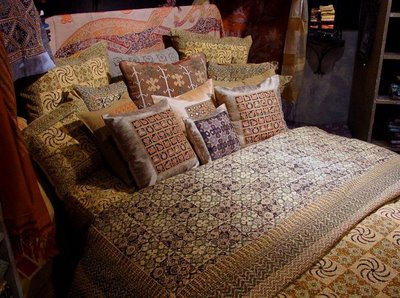 And I found this place. Not Debi. Me. I wandered in here while avoiding shopping.
And I found this place. Not Debi. Me. I wandered in here while avoiding shopping.
It’s Maiwa Handprints. And I started to get it as soon as I wandered through the door. Here and there amid the textiles, I find a book subtly perched. Each book describes a traditional weaving culture from around the world. And each cloth I pick up is handwoven, naturally dyed, beautiful. My hands understand everything at once.
Debi arrives. She understands even more quickly than I.
I pick up a brochure from the counter. “Craft is the language of a culture,” it reads.
This is our last day in Vancouver. Maiwa Handprints has established Maiwa Foundation as a non-profit organization dedicated to “eradicating poverty in rural villages by promoting the economic self-sufficiency of the artisans living in such villages.”
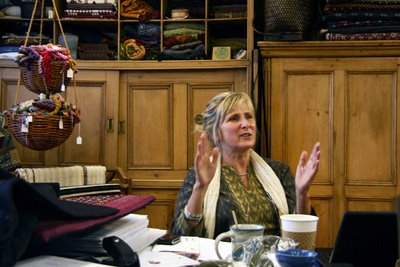 Charllotte Kwon, the founder of Maiwa, is leaving the next day for an exhibition on the Sunshine Coast. No matter. We ask if we could talk with her, and suddenly she appears and whisks us upstairs into offices that are more like the textile archives for someone wanting to research the resilience of artisanal weaving around the world.
Charllotte Kwon, the founder of Maiwa, is leaving the next day for an exhibition on the Sunshine Coast. No matter. We ask if we could talk with her, and suddenly she appears and whisks us upstairs into offices that are more like the textile archives for someone wanting to research the resilience of artisanal weaving around the world.
She takes out handcrafted textiles almost too beautiful to bear. I’m scribbling madly. It takes me awhile to realize we’re learning a business model here. Charllotte spends six months of every year in India. Maiwa holds workshops every year, and symposia every other year, bringing artisans from rural villages who learn how to present their own work, teach a class, and give an exhibit.
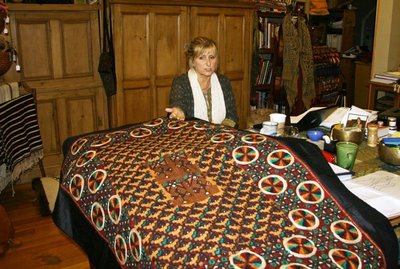 A recent Maiwa symposium brought together weavers from a rural village in India and quiltmakers from Gee’s Bend in Alabama. The women couldn’t understand the others’ spoken language. That was no impediment. They understood the weaving. A Hindu woman took a quilt from a Gee’s Bend quilter’s hands and began working on it herself. The Gee’s Bend quilter took up the Indian weaving in turn herself. It went on and on that way.
A recent Maiwa symposium brought together weavers from a rural village in India and quiltmakers from Gee’s Bend in Alabama. The women couldn’t understand the others’ spoken language. That was no impediment. They understood the weaving. A Hindu woman took a quilt from a Gee’s Bend quilter’s hands and began working on it herself. The Gee’s Bend quilter took up the Indian weaving in turn herself. It went on and on that way.
“The whole point of Maiwa,” Charllotte says, “is to help people fall in love with the other.”
Visit Maiwa's website.

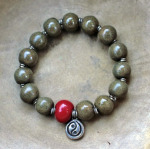
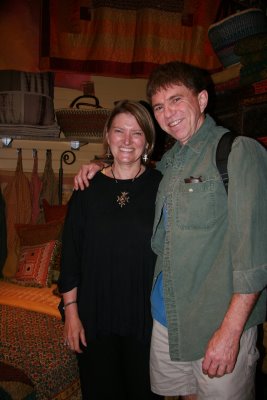
Reader Comments (1)
I love these words, “The women couldn’t understand the others’ spoken language. That was no impediment. They understood the weaving. A Hindu woman took a quilt from a Gee’s Bend quilter’s hands and began working on it herself. The Gee’s Bend quilter took up the Indian weaving in turn herself. It went on and on that way.” How beautiful and amazing to have experienced that exchange between the artists.